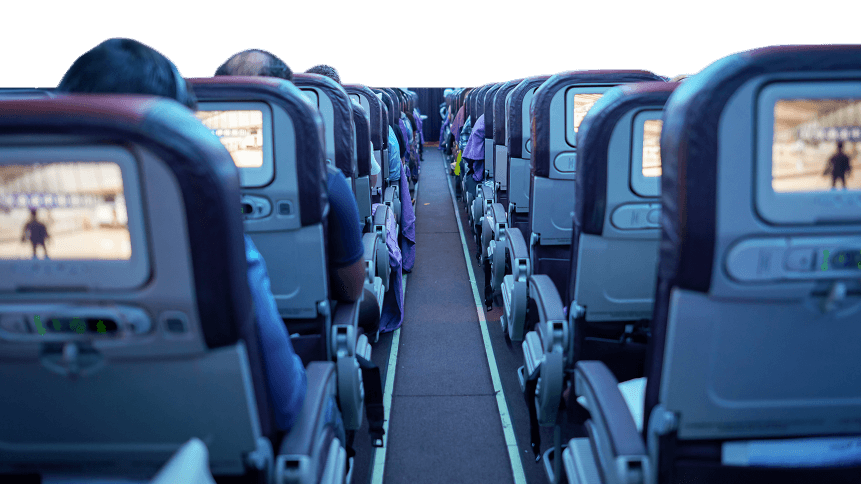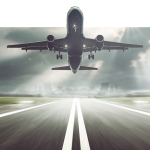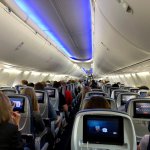The tech helping CX take flight in the aviation industry

The aviation industry is undergoing massive transformation. Just last year, Finland made steps to make its airports AI-optimized, while Virgin Atlantic deployed an IoT network to monitor aircraft equipment, but more innovation is set to take off as we roll into 2020.
A Lyft from the airport
Speaking at the Consumer Electronics Show (CES) in Las Vegas, Delta’s CEO Ed Bastian announced the airline’s plans to adopt technology to improve the flying experience for passengers.
After unveiling a futuristic vision of what travel will look like in 2025, Bastian showcased the technology used to turn this vision into reality.
One of the trends gaining momentum in the aviation industry is an increase in partnerships and collaborations to make the experience more seamless and fluid. Delta announced an extended partnership with Lyft, which currently allows Delta fliers to earn miles when using Lyft to book rides. Currently, the Atlanta-based airline has plans for a dedicated premium Delta-Lyft experience and may enable frequent flier miles to pay for rides.
Meanwhile, the company envisions its Fly Delta app to be the single app to provide all services which passengers may require.
“Instead of checking one app for traffic, another for airport parking and a third for TSA wait times, Delta is building the capability to simplify travel by helping you manage everything from ridesharing and in-flight entertainment to bag delivery and hotels.
“We’re excited to start exploring these possibilities with an innovative leader like Lyft, with whom we share a passion for making the customer travel experience even more rewarding,” said Bastian.
Facial recognition technology
After testing the effectiveness of face recognition technology at the boarding gates of Heathrow, British Airways is deploying the same technology at John F. Kennedy International Airport in New York.
The facial detectors will match the faces of passengers to local systems for identity verification. Instead of presenting their passports at departure gates, passengers look into the camera before boarding for their biometric data to be verified. Then upon confirmation, they will board the craft and be greeted by the cabin crew.
BA follows in the footsteps of Delta, which unveiled the first biometric terminal in the United States last year. In what the airline hopes will reduce some of the stress of air travel, the technology will negate the need for travelers to show their passport from “curb to gate”. That includes points such as checking in at self-service kiosks, dropping checked baggage, presenting ID at the TSA checkpoint, and other points.
Predictive models for flight delays
Besides digital airport innovations designed at taking friction out of the boarding experience, JetBlue Technology Ventures is working with Lumo to create a statistical model that simulates flight conditions and ultimately help predict flight delays.
The model takes into account the plane density and analyzes the decisions made by the Federal Aviation Administration in similar weather predictions. The data gets translated into a rating score and offer real-time forecasts of how likely a flight will be delayed.
Fret not fellow passengers, the app also suggests alternative routes if rebooking is needed. In the long run, airlines will benefit from predictive models with higher accuracy as rearrangements and helping passengers seek the optimal alternative routes becomes easier.
Meanwhile, logistics and scheduling will be enhanced by the rise of quantum computing in the coming years. Airbus, for example, is exploring how the technology could leverage the masses of data supplied by sensor-laden aircraft to optimize routes, demand, and schedules simultaneously. The result could be more efficient, faster journeys at a lower cost to the consumer, and lowered carbon emissions.
Lost luggage compensation made easy
Improving the customer experience (CX) may be the priority of the aviation industry, but issues such as delays and lost luggage remain— at present, at least— an unfortunate inevitability.
Airlines mislay 25 million bags a year, but even though technological solutions may not be able to prevent the loss of luggage (although sensors may increasingly spell the solution), it can help airlines with damage control.
Lufthansa uses an app called Linea to reimburse passengers instantly in the event of lost luggage, while the app lets passengers track carriers retrieving luggage in real-time.
Gleb Tritus, Managing Director of Lufthansa’s think tank, explained that passengers can skip the queue at the luggage counter and be notified instantly if their luggage is misplaced with a small token of apology. Passengers can upload receipts of replacement goods to be refunded straight away.
The aviation industry is set to grow in proportion with its investments as more innovation hubs are developed to examine and cultivate new applications of technology in the industry. In 2018, for example, major airlines such as KLM and Air France announced Big Blank, an incubation studio that will explore the latest trends in aviation and support innovative projects with high potential for disruption.










